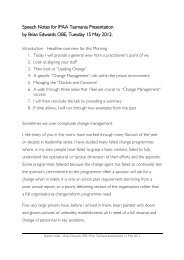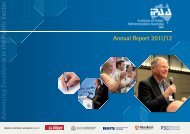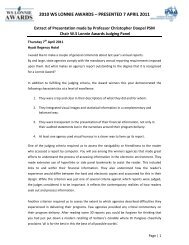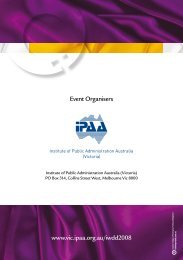Review of Victoria's integrity and anti-corruption system - IPAA Victoria
Review of Victoria's integrity and anti-corruption system - IPAA Victoria
Review of Victoria's integrity and anti-corruption system - IPAA Victoria
- No tags were found...
Create successful ePaper yourself
Turn your PDF publications into a flip-book with our unique Google optimized e-Paper software.
Each <strong>of</strong> the members <strong>of</strong> VIACC should have powers necessary to identify <strong>and</strong> investigate seriousmisconduct <strong>and</strong> <strong>corruption</strong>. They should have powers to summons witnesses, compel witnessesto answer questions, override privileges (eg. self-incrimination), enter premises occupied by apublic authority, <strong>and</strong> conduct searches <strong>and</strong> seizures (upon application to a Supreme Court judgefor a warrant). However, the Public Sector Integrity Commissioner <strong>and</strong> Chief Municipal Inspector’spowers should not extend to holding public hearings given the potential for significant reputationdamage to witnesses. The checks <strong>and</strong> balances, including oversight arrangements, for theexercise <strong>of</strong> these powers should be outlined in legislation. The exercise <strong>of</strong> powers would besubject to principles <strong>of</strong> procedural fairness that could be abrogated only ins<strong>of</strong>ar as necessary <strong>and</strong>appropriate for VIACC’s effective functioning.The Director, Police Integrity should retain additional powers that may not be independentlyexercised by the other two members <strong>of</strong> VIACC, reflecting the distinct challenges <strong>of</strong> investigatingcorrupt police. This includes powers to apply to a magistrate to enter private premises or a vehicle;apply to a Supreme Court judge to use a surveillance device; apply to a federal judicial <strong>of</strong>ficer touse telephone interception; authorise controlled operations; possess <strong>and</strong> use defensive equipment<strong>and</strong> firearms; <strong>and</strong> hold public hearings in exceptional circumstances, defined by a public interesttest. Each <strong>of</strong> these powers should continue to have strict use <strong>and</strong> monitoring requirements. Exceptfor the power to possess <strong>and</strong> use defensive weapons <strong>and</strong> firearms, these powers should apply toinvestigations involving sworn <strong>of</strong>ficers or unsworn employees <strong>of</strong> <strong>Victoria</strong> Police. The use <strong>of</strong>defensive weapons, including firearms, should be restricted to operations involving sworn <strong>of</strong>ficers.The exercise <strong>of</strong> stronger powers, including covert powers, should be restricted to extraordinarysituations that justify the abrogation <strong>of</strong> individual liberties. In rare circumstances the Public SectorIntegrity Commissioner or the Chief Municipal Inspector may require access to powers otherwiserestricted to the Director, Police Integrity. In these circumstances they should be able to refer aninvestigation to the Director, Police Integrity; conduct a joint investigation with the Director, PoliceIntegrity; or draw on the expertise <strong>of</strong> the Director, Police Integrity’s investigators. Additionalrequirements would need to be satisfied to access stronger powers. The proposed requirementsare outlined in section 4.3 <strong>of</strong> the <strong>Review</strong> report.modernising the Ombudsman ActModernising the Ombudsman Act would provide an opportunity to establish a clear locus <strong>of</strong>responsibility for the Office <strong>of</strong> the Ombudsman within a broader <strong>integrity</strong> <strong>system</strong>. This would enablethe Ombudsman to focus on investigating citizen complaints <strong>and</strong> concerns (including own motionenquiries) into administrative actions. With Ombudsman investigations focused onmaladministration <strong>and</strong> misconduct <strong>and</strong> VIACC investigations focused on serious misconduct <strong>and</strong><strong>corruption</strong>, each <strong>integrity</strong> body can tailor its investigations practice in accordance with the type <strong>of</strong>behaviour concerned. Coordination between bodies would be required to address potentialoverlap.Modernising the Ombudsman Act should encompass:• clarifying the locus <strong>of</strong> responsibility for Ombudsman within the <strong>integrity</strong> <strong>system</strong>;• explicitly codifying principles <strong>of</strong> procedural fairness to apply during Ombudsmaninvestigations;• specifying oversight arrangements for the Ombudsman. Oversight <strong>of</strong> the Ombudsman shouldrespect the Ombudsman’s status as a constitutionally enshrined independent <strong>of</strong>ficer <strong>of</strong> theParliament; <strong>and</strong>• considering whether to codify in the Act the Ombudsman’s current practice <strong>of</strong> using patterns<strong>of</strong> complaints to trigger own motion enquiries <strong>and</strong> investigations.xvi | <strong>Review</strong> <strong>of</strong> <strong>Victoria</strong>’s <strong>integrity</strong> <strong>and</strong> <strong>anti</strong>-<strong>corruption</strong> <strong>system</strong>









